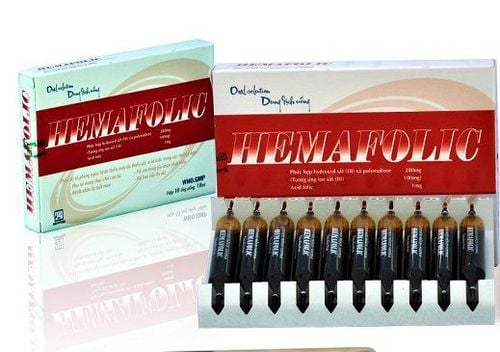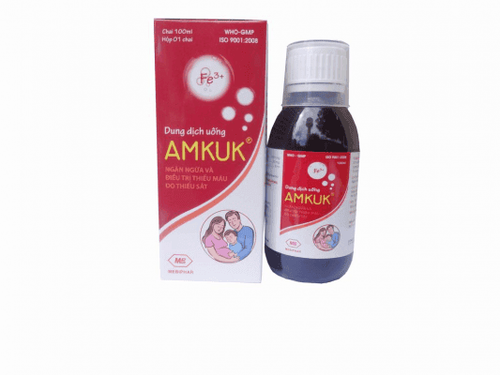This is an automatically translated article.
Ferrous fumarate is an iron (II) salt, used in the prevention and treatment of iron deficiency anemia. Depending on the cause, condition and progress of each patient, there is an appropriate dose of Ferrous fumarate. The following article provides you with some information on indications, dosage and treatment of Ferrous fumarate overdose.
1. What is Ferrous fumarate?
Ferrous fumarate is an iron(II) salt of fumaric acid, used to supplement iron levels. The drug Ferrous fumarate has the dosage forms of tablets with the amount of 210mg, 322mg; Syrup solution with content of 140mg/5ml.
Iron is found in most cells and has many important functions for life. Iron ions are components of several enzymes necessary for energy transfer (such as xanthine oxidase, cytochrome oxidase). In addition, iron is present in compounds necessary for the transport and use of oxygen (such as hemoglobin, myoglobin).
2. Indications and contraindications for using Ferrous fumarate
2.1.Indications Ferrous fumarate is used in the prevention and treatment of iron deficiency anemia, such as after gastric bypass surgery, pregnancy, malnutrition syndrome.
2.2.Contraindications Patients who are allergic or sensitive to Ferrous fumarate. Body excess iron: hemosiderin infection, hemolytic anemia, iron-contaminated tissue disease. Paroxysmal nocturnal hemoglobinuria. Hemoglobin disease. Repeated blood transfusion. Not to be used to treat non-iron deficiency anemia. Peptic ulcer, Inflammatory bowel disease. Esophageal stricture.
3. How to take Ferrous fumarate
Ferrous fumarate is better absorbed if taken on an empty stomach. However, the drug has the potential to irritate the stomach lining, so doctors often recommend that patients take Ferrous fumarate 1 hour before eating or 2 hours after eating. Do not chew the tablet while taking it. For patients with difficult tolerability, the drug should be started with the minimum dose, divided into several doses and then increased until the target dose.
The following dosage is in elemental iron (orally): 1g of iron(II) fumarate contains 330 mg of elemental iron.
Adults:
Treatment of iron deficiency anemia: 65-200mg/day, divided into 3 times. Prevention of iron deficiency anemia: 30-60mg/day. Recommended duration of Ferrous fumarate: ≤ 6 months, or 3 months after hemoglobin returns to normal. Children:
Treatment of iron deficiency anemia: 3-6 mg/kg/day divided into 2-3 times. Maximum dose: 200 mg per day.
Prevention of iron deficiency anemia:
Infants ≥ 6 months old to children < 2 years old: 10-12.5mg/day. Children from 2 to 5 years old: 30 mg/day. Children 5-12 years old: 30-60 mg/day. Children older than 12 years: the same dose as adults.
4. Undesirable effects of the drug Ferrous fumarate
Some side effects when taking Ferrous fumarate may be: dark stools, gastrointestinal discomfort, diarrhea, constipation, vomiting, nausea, tooth discoloration, heartburn. Undesirable effects in the urinary system such as urine discoloration.In very rare cases, skin rash and loss of appetite may be seen. Allergic reactions may also occur. In addition, there have been reports of cancer risk associated with excessive iron stores.
5. Note when using iron drug Ferrous fumarate
Use with caution in patients with a history or suspicion of peptic ulcer, enteritis or chronic ulcerative colitis. Ferrous fumarate is available as a film-coated, slow-release tablet that may be toxic to the elderly or to patients with slow bowel movements. Long-term treatment with ferrous fumarate syrup increases the risk of tooth decay. Maintain adequate oral hygiene while taking Ferrous fumarate. Ferrous fumarate is not indicated for the treatment of anemia of causes other than iron deficiency. Patients with liver failure, kidney failure: use caution when using the drug. Avoid administering to premature infants with low vitamin E stores, until the infant is adequately supplemented with vitamin E. Pregnant women: Ferrous fumarate can be used in pregnant women with anemia caused by iron and folic acid deficiency.
6. Ferrous fumarate overdose and treatment
Toxic dose: less than 30 mg iron(II)/kg can cause moderate toxicity. Doses above 60 mg iron(II)/kg cause serious toxicity. Fatal dose: from 80 to 250 mg iron(II)/kg. Several cases of fatal poisoning have been reported in children 1 to 3 years of age. The lowest reported lethal dose for children was 650g iron(II) equivalent to 3g iron(II) sulfate heptahydrate. Symptoms of drug overdose Ferrous fumarate
Nausea, vomiting, abdominal pain, diarrhea, vomiting blood, black stools, rectal bleeding. Circulatory collapse, coma, hyperglycemia, metabolic acidosis. In severe cases, coma, hypotension, hypothermia, convulsions, toxic encephalitis, central nervous system damage, pulmonary edema, hepatocellular necrosis, renal failure, disseminated embolism may occur. blood clotting disorder. How to handle overdose
In case of symptoms of an overdose of Ferrous fumarate, it is necessary to stop using the drug and immediately go to a medical facility for timely treatment. Treatment of an overdose of Ferrous fumarate is mainly symptomatic and supportive.
Make sure the airway is clear. Induce vomiting and wash the stomach with Desferrioxamine solution (2g/L), dissolve Desferrioxamine 5g in 50-100 ml of water to keep it in the stomach after emptying the stomach. Sorbitol or Mannitol can be used to empty the small intestine.
In case of shock or coma patient with high serum Fe concentration > 90μmol/L in children; > 142 μmol/L in adults; Apply supportive measures and slow intravenous infusion of desferrioxamine (5mg/kg/hour, maximum 80mg/kg/24 hours).
In the case of less severe symptoms, Desferrioxamine 1g intramuscularly every 4-6 hours in children or 50mg/kg, up to a maximum of 4g in adults.
During treatment, it is necessary to monitor serum Fe concentration, blood pressure, heart rate, urine output. In the case of persistent metabolic acidosis in adults, administer 50mmol sodium bicarbonate and repeat if necessary, monitor arterial blood gases.
7. Drug interactions
Ferrous fumarate may reduce the absorption of Ofloxacin, C iprofloxacin, Norfloxacin, Penicilamin, Levodopa, Methyldopa, thyroid hormone and zinc salts. Antacids such as calcium carbonate, sodium carbonate and magnesium trisilicate may reduce the absorption of ferrous fumarate. Iron can chelate with tetracyclines and reduce the absorption of both drugs. Chloramphenicol slows plasma iron clearance, introduces iron into red blood cells and interferes with erythropoiesis. Iron absorption may be reduced when Ferrous fumarate is co-administered with tea, eggs, milk, coffee, tea. Ferrous fumarate is an iron (II) salt, used in the prevention and treatment of iron deficiency anemia. To ensure the effectiveness of treatment and avoid unwanted side effects, patients need to strictly follow the instructions of the doctor, professional pharmacist.
Follow Vinmec International General Hospital website to get more health, nutrition and beauty information to protect the health of yourself and your loved ones in your family.
Please dial HOTLINE for more information or register for an appointment HERE. Download MyVinmec app to make appointments faster and to manage your bookings easily.













